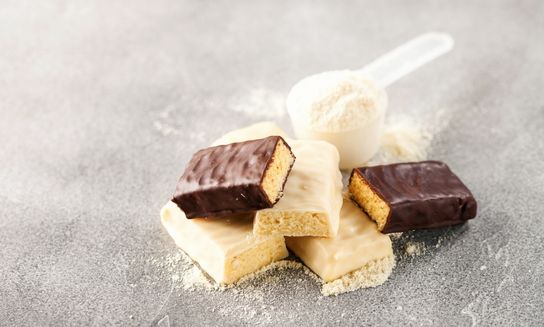Collagen peptides offer added value to athletes
The food industry had already recognised the potential of collagen peptides in the 1970s. Since then, collagen peptides have been added to specialised foods as a pure, natural product, and make them easier to digest, a better source of protein and of greater nutritional value. Perfectly in sync with the modern age, where foods are expected to do a lot more than just satisfy hunger.

Popular in bars and shakes
Sports nutrition is one of the main areas in which it has become common practice to add collagen peptides to products such as protein bars or shakes. However, these are also products that have to meet more stringent consumer demands: they have to taste good, not weigh the body down and have been tested for safety.
Collagen peptides are ideal for modern sports nutrition and are neutral in flavour, which means that they do not leave a bitter aftertaste that has to be masked in the final product, for example through sugar or artificial sweeteners, as is often the case with soy, whey or other protein hydrolysates. Collagen peptides have been scientifically tested, have no undesirable side effects and are not known to elicit allergic reactions. The white powder is easy to dissolve in cold liquids. It emulsifies, foams, adds consistency, binds and improves the shelf life of products.
Since it is so similar to the proteins found in the human body, it is absorbed and “processed” extremely well. In cereal bars, for example, the protein replaces unwelcome carbohydrates and sticky sugars as a binding agent. The amino acids it contains further promote the impact of the sports activity. Collagen peptides increase the protein fraction, thus extending the period of satiation and making it easier to maintain a certain weight, facilitates muscle development in the body and have a regenerative and preventive effect on the joint cartilage.
Proteins make the difference
Fifteen to 20 per cent of the human body is made up of a range of different proteins. However, in contrast to carbohydrates and fat, the body cannot store these and also cannot generate many of the proteins by itself. Collagen is one of the most important of these proteins. It makes up approximately 30 per cent of the total protein deposits in the human body and is primarily found in connective tissue such as bones, cartilage, tendons, ligaments and skin. The more protein a body expends through physical exertion, the greater its need for an external source, for example in the form of special dietary supplements such as protein shakes, energy bars or sports drinks. Studies have shown that products fortified with collagen peptides can promote joint health and bone synthesis.

Many recreational athletes train according to the motto “more is more”. Unfortunately, what they often forget in doing so is that the body also needs rest. In fact, engaging in sports without sufficient regeneration periods can even have a negative effect. After all, the body adapts to training stimuli during recovery phases, which means that muscles do not grow during exercise, but during periods of rest and regeneration. It is therefore not only essential to offer the body relaxation in the form of a massage or a trip to the sauna, but also to supply it with the proper nutrients after every workout.
Next to carbohydrates, athletes primarily need proteins to keep their organisms from breaking down instead of building up endogenous protein structures such as the muscles. Proteins like collagen peptides supply the body with the building blocks essential for the development of endogenous proteins, the formation of muscle tissue and the renewal of cells. Many athletes do not feel like eating immediately after completing a strenuous workout. In this case, beverages rich in protein are the ideal solution and supply the body with the necessary nutrients faster than solid foods. After all: beverages that contain such ingredients as collagen peptides in addition to electrolytes and carbohydrates help athletes recharge their batteries faster and make optimal use of rest periods.
Collagen peptides can be taken before and after exercising:
- The resistance of the protein building blocks is affected during and after longer periods of physical exertion. Proteins oxidise and the membranes suffer microfine injuries that can lead to inflammation and, in turn, to a loss of proteins. Eating foods very high in protein immediately following physical exertion can support muscle development and prevent a loss of protein.
- Studies have shown that ingesting creatine while doing sports helps improve performance during short training intervals by helping athletes build up muscle mass. Creatine is a molecule that is made up of three amino acids: glycine, arginine and methionine. Collagen peptides, which are made up of 20 per cent glycine and 8 per cent arginine, can positively influence the development of creatine in the body.
- Several studies have shown the beneficial effect of ingesting even small doses of dietary supplements containing arginine during a sports activity. A daily dose of 10 grams of collagen produces almost a gram of arginine per day and may thus promote athletic performance.
- And, as a special bonus, it is also said to have a positive effect on the physical appearance: it strengthens the connective tissue, skin, nails and hair. This is why collagen peptides are also available as a dietary supplement in the form of capsules or liquid ampoules.
